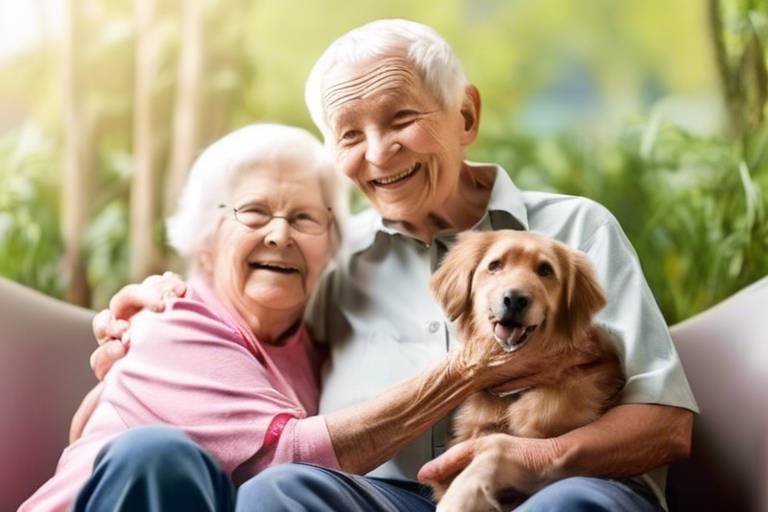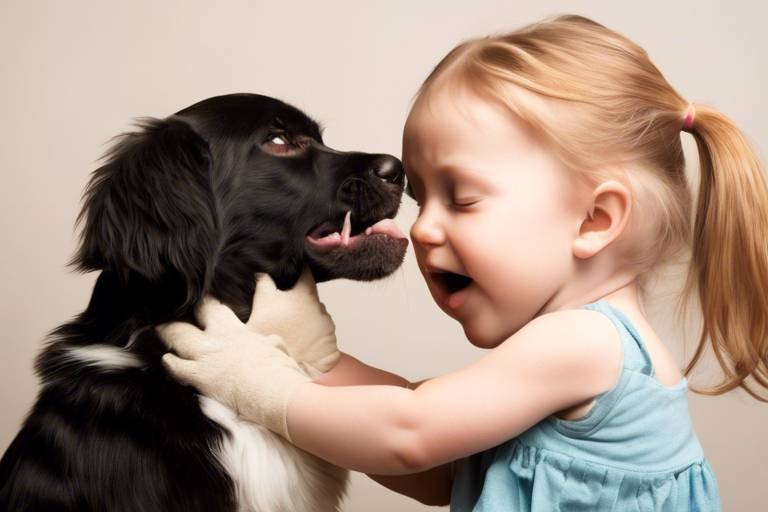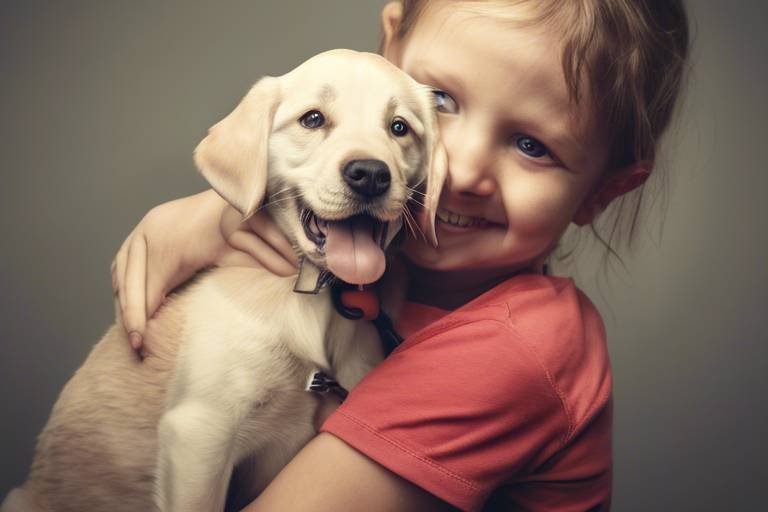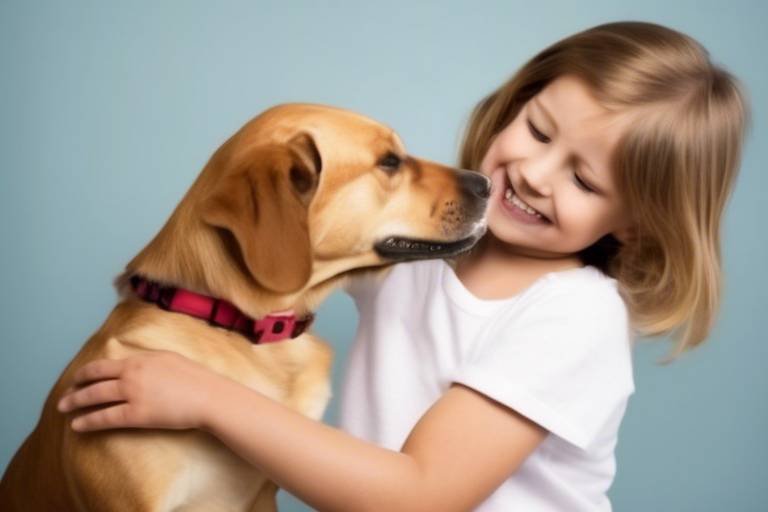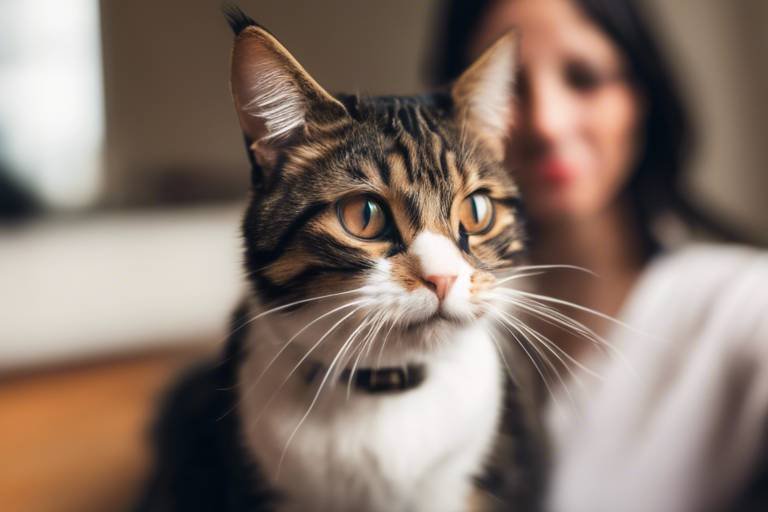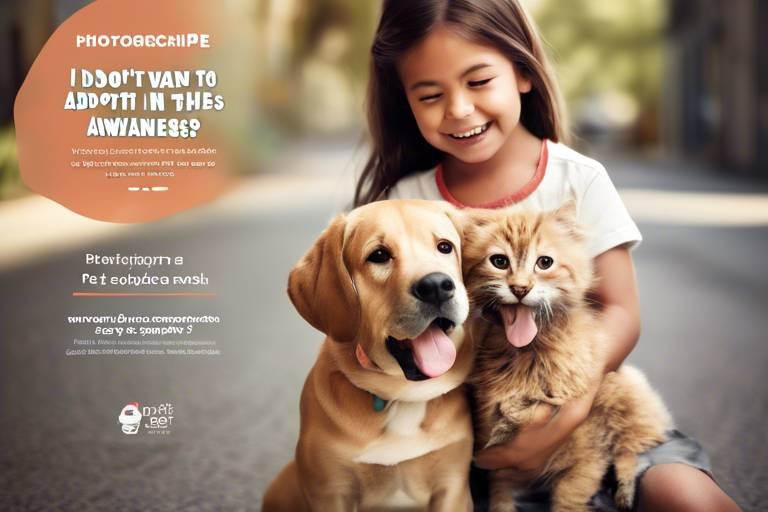The Benefits of Pet Adoption for Elderly Individuals
This article explores how pet adoption can significantly enhance the lives of elderly individuals, offering companionship, emotional support, and numerous health benefits that contribute to overall well-being. As we age, the need for connection and purpose becomes increasingly vital, and what better way to achieve that than through the unconditional love of a pet? Imagine coming home to a wagging tail or a gentle purr; it’s like having a little piece of joy waiting for you every day. Pets not only fill our homes with love but also enrich our lives in ways we might not even realize.
Adopting a pet provides elderly individuals with companionship, reducing feelings of loneliness and depression. The bond formed with a pet can lead to improved mental health and a sense of purpose in daily life. Think about it: when you have a furry friend by your side, you’re not just sharing space; you’re sharing experiences, emotions, and moments that make life feel a little brighter. Pets can be a source of comfort during tough times, offering a listening ear (or a soft paw) that helps us navigate the challenges of aging.
Owning a pet encourages physical activity, which is essential for maintaining health in older adults. Regular walks and playtime can help improve cardiovascular health and mobility, contributing to a more active lifestyle. Just picture this: every time you take your dog out for a stroll, you’re not only giving them exercise but also getting your heart pumping and your legs moving. It’s a win-win situation! The joy of spending time outdoors with a pet can transform exercise from a chore into a delightful routine.
Daily routines involving pet care motivate elderly individuals to engage in physical activity, promoting better fitness levels. This can lead to improved strength, balance, and overall physical health over time. Whether it’s a leisurely walk in the park or a playful game of fetch in the backyard, these activities help keep the body active and engaged. Plus, the excitement of pets can make these exercises feel less like a workout and more like a fun adventure.
Pets can help combat sedentary lifestyles by encouraging their owners to move more. This shift can positively affect weight management and reduce the risk of chronic diseases prevalent in older adults. When you have a lively companion nudging you for a walk or a play session, it becomes much harder to stay glued to the couch. It’s like having a built-in personal trainer who’s always ready to motivate you!
Studies show that pet owners often experience lower blood pressure and cholesterol levels. The calming presence of pets can contribute to heart health and reduce stress-related issues. Just think about how soothing it is to stroke a pet’s fur or listen to their rhythmic breathing. These simple actions can significantly lower stress levels, making your heart feel lighter in more ways than one.
Pet ownership can facilitate social connections, as pets often serve as conversation starters. Elderly individuals may find it easier to meet new people and engage with their communities through pet-related activities. Whether it’s chatting with fellow dog owners at the park or participating in pet adoption events, pets can help break the ice and foster new friendships. It’s amazing how a little furball can lead to big connections!
Having a pet creates a daily routine that can provide elderly individuals with structure and stability. This sense of responsibility can contribute to improved mental clarity and focus. The act of caring for a pet gives life a rhythm, a predictable flow that can be incredibly comforting. It’s like setting the stage for a daily play where the pet is the star, and you’re the devoted audience and caretaker.
Caring for a pet involves regular feeding, grooming, and exercise, which can help elderly individuals maintain a sense of purpose and engagement in their daily lives. These responsibilities can be fulfilling, as they remind individuals that they are needed and valued. It’s a beautiful way to stay connected to the world around you, ensuring that every day holds a little excitement and joy.
Establishing a routine with a pet can help elderly individuals cope with changes in their lives, providing a sense of normalcy and comfort during challenging times. In a world that can often feel unpredictable, having a pet means having a constant, a source of love and stability that remains unwavering. It’s like having a lighthouse in a storm, guiding you back to safety and comfort.
Selecting the appropriate pet is crucial for ensuring a successful adoption experience. Factors such as size, temperament, and care needs should be considered to match the elderly individual's lifestyle. Not every pet is suited for every person, and finding the right match can make all the difference. It’s essential to assess not just the pet’s needs but also the individual's capabilities and lifestyle.
For those living in smaller homes or apartments, small dog breeds or cats can be ideal companions, providing affection without requiring extensive space or exercise needs. These pets can fit comfortably into any living situation, making them perfect for individuals who want companionship without the added physical demands of larger breeds.
Elderly individuals may benefit from adopting pets that require less grooming and care, such as certain cat breeds or small animals like rabbits, making pet ownership more manageable and enjoyable. Choosing a pet that fits seamlessly into one’s lifestyle can enhance the overall experience, ensuring that the joy of pet ownership is not overshadowed by overwhelming responsibilities.
- What are the best pets for elderly individuals? Small dogs, cats, and low-maintenance pets like rabbits are often recommended.
- How can pets help with loneliness? Pets provide companionship, emotional support, and a sense of purpose.
- Are there any health benefits to pet ownership? Yes, pets can lower blood pressure, encourage exercise, and improve mental health.
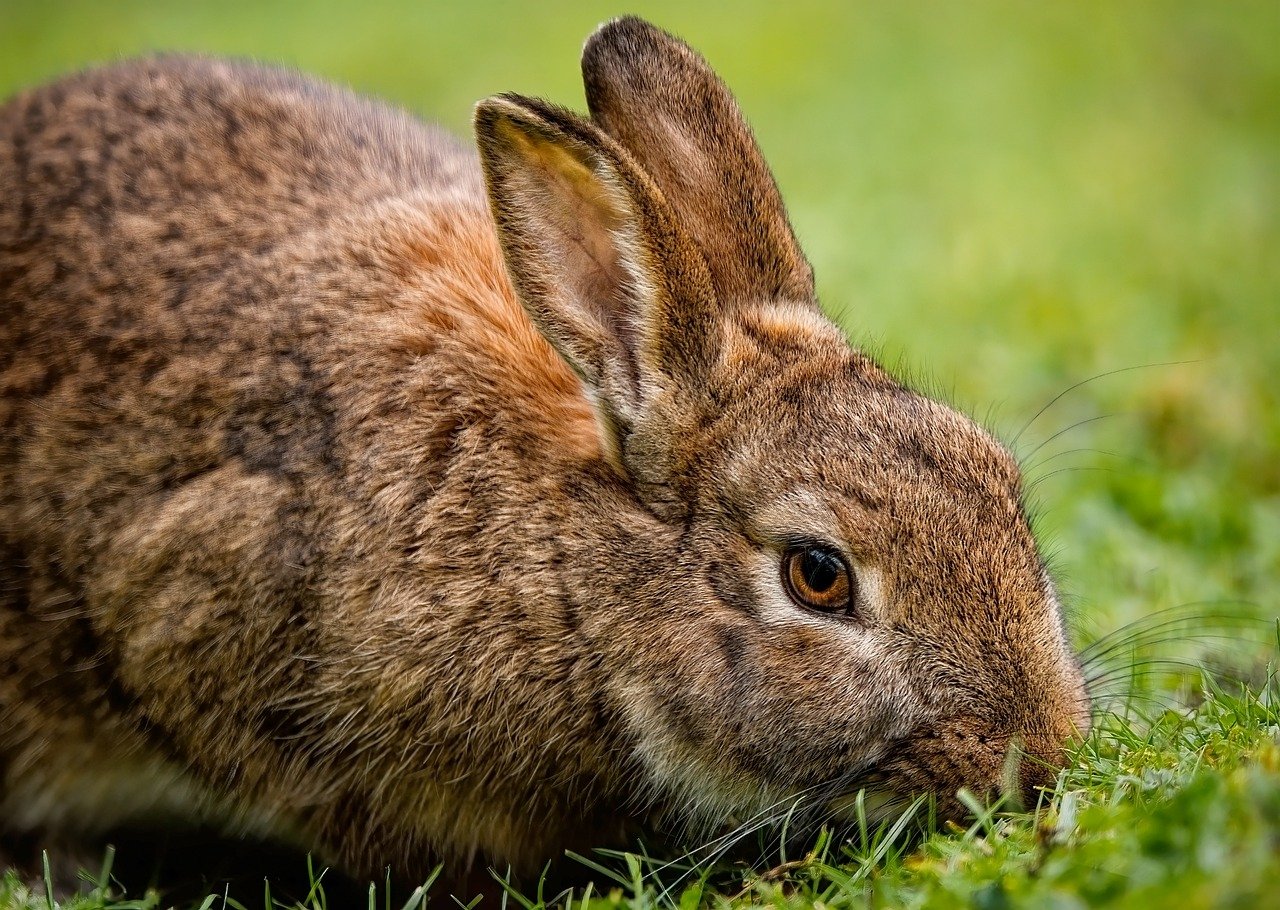
Emotional Support and Companionship
Adopting a pet can be a transformative experience for elderly individuals, offering much more than just a furry friend. The companionship that pets provide can significantly reduce feelings of loneliness and depression, which are common challenges faced by many older adults. Imagine coming home to a wagging tail or a gentle purr; it’s like having a little bundle of joy waiting just for you! This bond can lead to enhanced mental health and a renewed sense of purpose in daily life.
Pets have an uncanny ability to sense our emotions. When an elderly person feels down, their pet can offer a comforting presence that is often more effective than any medication. Studies have shown that interacting with animals can trigger the release of oxytocin, a hormone that promotes bonding and emotional connection. This connection can be especially crucial during times of transition or loss, providing a source of unconditional love and support.
Furthermore, having a pet encourages a more active social life. Pets can serve as excellent conversation starters, making it easier for elderly individuals to engage with others. Whether it’s chatting with neighbors during a walk or meeting fellow pet owners at the park, these interactions can foster a sense of community and belonging. In fact, many elderly individuals find that their pets help them forge new friendships, which can be incredibly valuable in combating social isolation.
As we delve deeper into the emotional benefits of pet ownership, it’s essential to recognize the various types of pets that can provide companionship. While dogs and cats are the most common choices, other animals like birds, rabbits, or even guinea pigs can also offer companionship and joy. Each type of pet has its unique way of connecting with their owners, and it’s crucial to find the right match that aligns with an individual’s lifestyle and preferences.
In summary, the emotional support and companionship that pets provide can significantly enhance the quality of life for elderly individuals. They not only help combat feelings of loneliness but also foster social connections and promote mental well-being. So, if you’re considering pet adoption, remember that you’re not just bringing home an animal; you’re inviting a loyal friend into your life who can make every day a little brighter!
- What types of pets are best for elderly individuals? Small dog breeds, cats, and low-maintenance pets like rabbits can be ideal companions.
- How can pets help with loneliness? Pets provide companionship and unconditional love, which can significantly reduce feelings of isolation.
- Do pets require a lot of care? It depends on the type of pet. Some require more grooming and exercise than others, so it's essential to choose one that fits your lifestyle.
- Can having a pet improve mental health? Yes, pets can provide emotional support, reduce stress, and promote feelings of happiness.
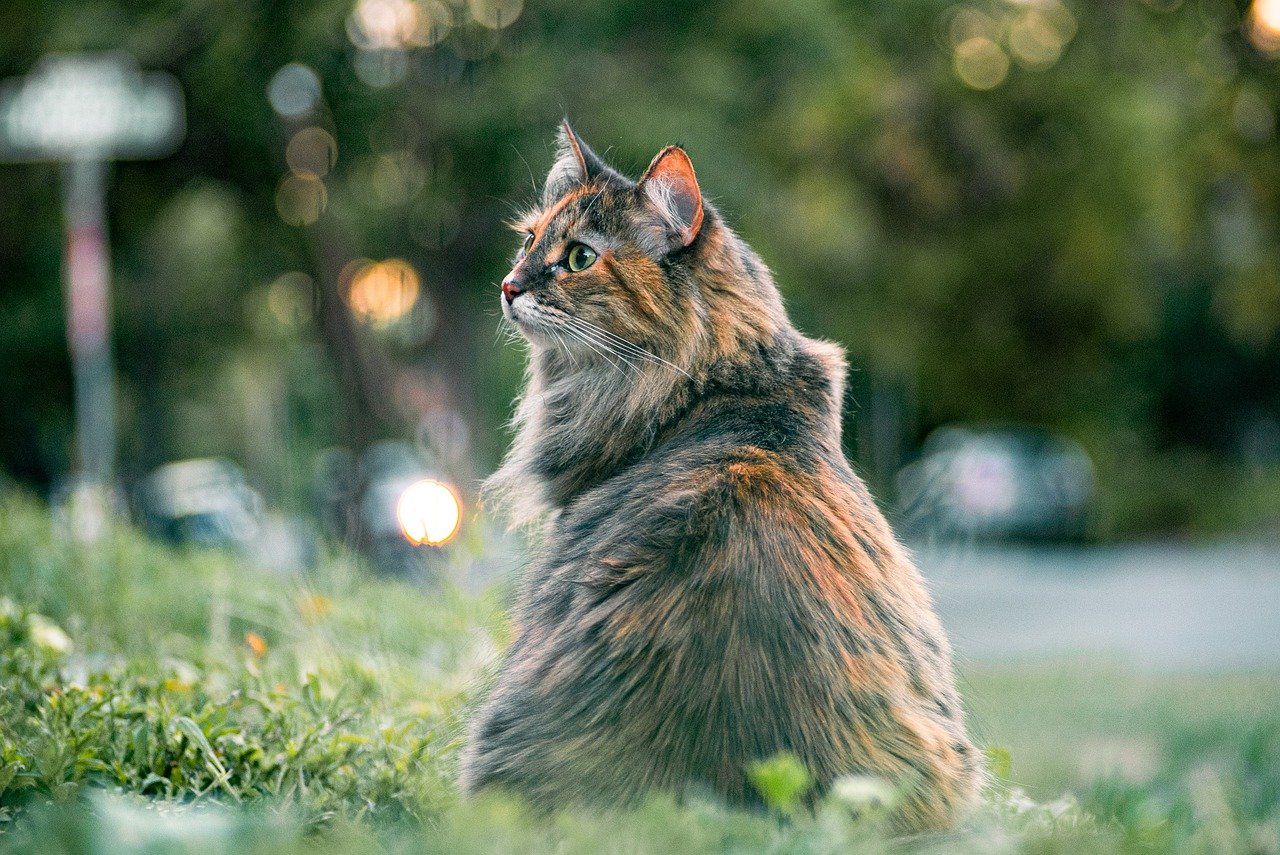
Physical Health Benefits
When it comes to the golden years of life, maintaining physical health is paramount, and pet adoption can be a game-changer. Owning a pet isn't just about companionship; it can also encourage a more active lifestyle, which is essential for elderly individuals. Imagine having a furry friend who nudges you to get up and take a stroll or play a game of fetch in the backyard. This simple act of caring for a pet can lead to significant health improvements.
One of the most notable benefits of pet ownership is the increase in physical activity. Regular walks become a routine, and these outings can be both enjoyable and beneficial for cardiovascular health. As you lace up your shoes and grab the leash, you're not just stepping outside; you're stepping towards a healthier heart. Studies have shown that elderly pet owners tend to engage in more physical activity compared to those without pets, which can lead to improved strength, balance, and overall fitness.
Daily routines involving pet care motivate elderly individuals to engage in physical activity, promoting better fitness levels. This can lead to improved strength, balance, and overall physical health over time. For example, a simple morning routine of feeding, grooming, and walking can easily turn into a mini workout session. It’s like having a personal trainer who is always eager to play!
In a world where sedentary lifestyles are becoming the norm, pets can be the perfect antidote. They encourage their owners to move more, whether it's through playful antics or the need for regular outdoor bathroom breaks. This shift can positively affect weight management and reduce the risk of chronic diseases prevalent in older adults. A study conducted by the American Heart Association found that pet owners are less likely to suffer from obesity-related issues, showing that a simple wagging tail can lead to a healthier waistline.
Moreover, the calming presence of pets can contribute to heart health and reduce stress-related issues. Research indicates that pet owners often experience lower blood pressure and cholesterol levels. The act of petting a dog or cat releases oxytocin, a hormone that promotes bonding and reduces stress. This not only helps to calm the mind but also has a positive impact on heart health, making pets a natural remedy for anxiety and stress.
To illustrate the benefits of pet ownership on physical health, consider the following table:
| Health Benefit | Description |
|---|---|
| Increased Physical Activity | Regular walks and playtime with pets promote cardiovascular health and mobility. |
| Weight Management | Active lifestyles with pets help in maintaining a healthy weight. |
| Lower Blood Pressure | Pet ownership is associated with reduced blood pressure and cholesterol levels. |
| Improved Mental Health | Caring for a pet can alleviate feelings of loneliness and depression. |
In summary, the physical health benefits of pet adoption are profound. From encouraging daily exercise to improving cardiovascular health, pets can significantly contribute to the overall well-being of elderly individuals. So, if you or someone you know is considering adding a furry friend to their life, remember that it’s not just about companionship; it’s a step towards a healthier, more active lifestyle.
1. What types of pets are best for elderly individuals?
Small dog breeds and cats are often recommended, as they require less exercise and are easier to care for.
2. How much exercise do I need to provide for my pet?
It typically depends on the breed, but short daily walks and play sessions can suffice for most pets.
3. Can pets help with mental health?
Yes! Pets offer companionship and can significantly reduce feelings of loneliness and depression.
4. Are there any health risks associated with pet ownership?
While there can be risks, such as allergies, the overall benefits often outweigh them. Regular veterinary care can help manage health issues.
Encouraging Daily Exercise
When it comes to staying active, having a furry friend can be a game-changer for elderly individuals. Pets, especially dogs, naturally encourage their owners to get up and move. Just think about it: a dog needs to go for walks, play fetch, or simply romp around the yard. This daily routine not only helps the pet but also provides the owner with a reason to step outside and engage in physical activity. It's like having a personal trainer who’s always excited to see you!
Moreover, the act of walking a dog can be an enjoyable and social experience. Picture this: as you stroll through the neighborhood, your dog eagerly wagging its tail, you might find yourself chatting with fellow dog owners or neighbors. This not only boosts your physical health but also enhances your social interactions. It’s a win-win situation!
In addition, engaging in pet care routines can significantly improve overall fitness levels. Here’s how:
- Regular Walks: Taking your dog for a walk can vary in intensity. Whether it’s a leisurely stroll or a brisk walk, it contributes to cardiovascular health.
- Playtime: Activities like playing fetch or tug-of-war can be fun and physically demanding, helping to build strength and endurance.
- Daily Chores: Tasks such as grooming or cleaning up after your pet can also keep you moving and active throughout the day.
Research indicates that pet owners tend to be more active than non-pet owners. The simple act of caring for a pet can lead to improved strength, balance, and flexibility, which are crucial for maintaining independence as one ages. In fact, studies have shown that regular physical activity can help reduce the risk of chronic diseases, such as heart disease and diabetes, which are prevalent among older adults.
So, if you’re considering pet adoption, remember that you’re not just giving a loving home to an animal in need; you’re also investing in your own health and well-being. The companionship of a pet can be the perfect motivator to keep you moving, active, and engaged in life. In essence, adopting a pet is like adopting a healthier lifestyle!
Reducing Sedentary Behavior
In our fast-paced world, sedentary behavior has become a common concern, particularly among elderly individuals. With the comforts of modern living, it’s all too easy to slip into a lifestyle that involves extended periods of sitting or inactivity. However, adopting a pet can be a game-changer in this regard. Pets naturally encourage their owners to move around more, breaking the cycle of inactivity that can lead to various health issues.
Imagine this: every morning, your furry friend is eagerly waiting by the door, tail wagging, ready for their daily walk. This simple act can transform your day from one of stillness to one filled with movement and joy. Regular walks not only provide essential exercise for both the pet and the owner but also offer fresh air and a change of scenery, which can be invigorating. As you stroll through the neighborhood, you might find yourself engaging with other pet owners, further enhancing your social interactions.
Moreover, pets require a variety of activities that can help reduce sedentary behavior. For instance:
- Playtime: Engaging in play with your pet, whether it's tossing a ball or playing with a feather toy, gets you up and moving. It’s a delightful way to incorporate physical activity into your day without it feeling like a chore.
- Grooming: Regular grooming sessions not only keep your pet clean but also involve movement, from bending down to brushing your pet to standing up while you clean their space.
- Training: Teaching your pet new tricks or commands can be a fun way to get active. It requires you to move around, and the excitement of training can be a great motivator for both you and your furry companion.
Incorporating these activities into your daily routine can significantly reduce the time spent sitting, leading to improved overall health. Studies have shown that even small increases in physical activity can have a positive impact on health outcomes, such as reducing the risk of heart disease, improving mood, and enhancing mobility.
Ultimately, the presence of a pet can serve as a constant reminder to stay active. They are not just companions; they are motivators that can help you reclaim your physical fitness. So, if you’re looking for a way to reduce sedentary behavior, consider adopting a pet. It’s a decision that can lead to a healthier, more active lifestyle, filled with love and companionship.
Q: What types of pets are best for elderly individuals?
A: Small dog breeds or cats are often ideal for elderly individuals, as they typically require less space and exercise. Low-maintenance pets like rabbits or guinea pigs can also be great options.
Q: How can I ensure my pet and I stay active together?
A: Establish a daily routine that includes walks, playtime, and training sessions. This not only keeps you active but also strengthens the bond between you and your pet.
Q: What if I have mobility issues?
A: Consider adopting a pet that requires less physical activity, such as a cat, and engage in gentle play or grooming activities that can be done while seated.
Improving Cardiovascular Health
When it comes to maintaining good health, cardiovascular health is paramount, especially for elderly individuals. One of the most delightful ways to enhance heart health is through the companionship of a pet. Studies have shown that pet owners often experience lower blood pressure and cholesterol levels, which are key indicators of a healthy heart. The calming presence of a pet can significantly reduce stress, which is a major contributor to heart disease. Just think about it: when you're cuddling with your furry friend, your body releases oxytocin, a hormone that promotes bonding and relaxation, leading to a decrease in stress levels.
Moreover, the simple act of caring for a pet can lead to increased physical activity, which is essential for keeping the heart healthy. Regular walks with a dog not only provide exercise but also encourage a routine that keeps the heart pumping. It's a win-win situation! Imagine strapping on your walking shoes, leash in hand, and heading out for a stroll with your canine companion. Each step you take is a step towards a healthier heart.
To further illustrate the benefits, consider the following table that summarizes how pet ownership can impact cardiovascular health positively:
| Benefit | Description |
|---|---|
| Lower Blood Pressure | Pet owners often experience reduced blood pressure levels due to the calming effects of their pets. |
| Reduced Cholesterol | Regular interaction with pets can lead to lower cholesterol levels, contributing to better heart health. |
| Lower Stress Levels | The companionship of pets reduces stress hormones, promoting relaxation and heart health. |
| Increased Physical Activity | Walking and playing with pets encourages regular physical exercise, crucial for cardiovascular fitness. |
In addition to these benefits, the emotional bond formed between pets and their owners is a powerful motivator for maintaining a healthy lifestyle. The joy and love that pets bring can inspire elderly individuals to take better care of themselves, not just for their own sake but for the sake of their beloved companions. This sense of responsibility can lead to healthier eating habits and regular check-ups, further supporting cardiovascular health.
In conclusion, adopting a pet is not just about companionship; it's about fostering a healthier lifestyle that can lead to improved cardiovascular health. So, if you're considering pet adoption, remember that you're not just gaining a friend; you're also investing in your heart's well-being!
- What are the best pets for elderly individuals? Small dog breeds or cats are often ideal due to their manageable care requirements.
- How can pets improve mental health? Pets provide companionship, reduce feelings of loneliness, and promote a sense of purpose.
- Are there specific breeds recommended for elderly owners? Yes, breeds that are low-maintenance and gentle in temperament are often recommended.
- Can pets help with physical activity? Absolutely! Pets encourage their owners to engage in regular exercise, which is vital for health.
Enhanced Social Interaction
Adopting a pet can be a game changer for elderly individuals when it comes to social interaction. Think about it: when you’re out walking your dog, what happens? People stop to say hello, share a smile, or even strike up a conversation. Pets, especially dogs, are like social magnets! They can break the ice and create connections that might not have happened otherwise. This newfound social engagement can lead to friendships, support networks, and a greater sense of community, which is especially valuable for those who may feel isolated.
Moreover, pet ownership opens doors to various community activities. Many neighborhoods host dog parks, pet-friendly events, and even training classes. These gatherings not only provide a platform for socializing but also foster a sense of belonging. Imagine attending a local pet fair or a dog training session where you can meet fellow pet lovers. Such interactions can help combat loneliness and enhance emotional well-being.
Interestingly, studies have shown that pet owners often report higher levels of happiness and lower levels of anxiety compared to non-pet owners. This could be attributed to the companionship pets provide, as well as the social opportunities that arise from having a pet. For elderly individuals, this is particularly important, as maintaining mental health is crucial for overall well-being.
Additionally, pets can encourage family visits. When grandchildren come over, they are likely to engage with their grandparents through the pet, whether it’s playing fetch or simply cuddling. This interaction can strengthen family ties and create cherished memories.
In conclusion, the enhanced social interaction that comes with pet ownership is a significant benefit for elderly individuals. It not only helps them connect with others but also enriches their lives in ways that go beyond companionship. So, if you’re considering pet adoption, remember that you’re not just bringing home a furry friend; you’re also opening the door to a more vibrant social life!
- How can a pet improve my social life?
Pets often act as conversation starters, making it easier to connect with others in your community. - What types of pets are best for social interaction?
Dogs are particularly good for socializing, but cats and other pets can also provide companionship and opportunities for interaction. - Can having a pet reduce feelings of loneliness?
Yes, pets provide companionship and a sense of purpose, which can significantly reduce feelings of loneliness. - What community activities can I participate in with my pet?
Look for local dog parks, pet fairs, training classes, and other community events that welcome pets.

Routine and Structure
Having a pet can transform the daily lives of elderly individuals by creating a structured routine that fosters a sense of stability. Imagine waking up every morning to the soft purring of a cat or the eager wagging of a dog's tail. This daily interaction not only brings joy but also instills a rhythm to their day. Establishing a consistent schedule for feeding, walking, and playing with a pet can provide a much-needed framework in what might otherwise feel like a chaotic world. This routine can be particularly beneficial for seniors who may be grappling with changes in their lives, such as retirement or the loss of a loved one.
Moreover, the responsibilities associated with pet care can significantly enhance mental clarity and focus. When elderly individuals have a set list of tasks to complete each day, they are less likely to feel aimless or lost. The act of caring for a pet—whether it’s ensuring they are fed on time or taking them for their daily walks—offers a sense of purpose that can be incredibly fulfilling. This engagement can also help to combat cognitive decline, as staying mentally active is crucial for maintaining sharpness in old age.
Additionally, the companionship provided by pets helps create a comforting atmosphere that can ease anxiety and promote emotional well-being. For many elderly individuals, pets become family members, offering unconditional love and support. This bond not only enriches their lives but also serves as a reminder that they are needed and valued. It’s like having a loyal friend who is always there to listen, providing comfort during the toughest of times.
To illustrate the benefits of routine and structure with pets, consider the following table that outlines typical daily activities that an elderly pet owner might engage in:
| Time | Activity | Benefits |
|---|---|---|
| Morning | Feeding the pet | Establishes a routine and provides a sense of responsibility |
| Midday | Short walk or playtime | Encourages physical activity and social interaction |
| Afternoon | Grooming or training | Enhances mental engagement and strengthens the bond |
| Evening | Quiet time or cuddling | Promotes relaxation and emotional comfort |
In summary, the routine that comes with pet ownership can significantly improve the quality of life for elderly individuals. It offers not just a structured day but also a profound sense of belonging and purpose. By integrating these daily activities into their lives, seniors can enjoy the myriad benefits that come from sharing their lives with a pet.
- What types of pets are best for elderly individuals? Small dog breeds, cats, and low-maintenance pets like rabbits can be ideal companions.
- How can a pet improve mental health for seniors? Pets provide companionship, reduce feelings of loneliness, and offer emotional support.
- Are there any specific health benefits associated with pet ownership? Yes, pet ownership can lead to improved cardiovascular health and encourage regular physical activity.
- What if an elderly person has mobility issues? Low-maintenance pets or those that require less exercise, such as cats or small dogs, can be great options.
- How can pets help create a daily routine? Caring for a pet involves regular feeding, exercise, and grooming, which can help structure an elderly person’s day.
Daily Responsibilities
Taking care of a pet is more than just a delightful experience; it comes with a set of that can greatly enhance the lives of elderly individuals. These tasks may seem simple, but they play a crucial role in maintaining a sense of purpose and engagement. For instance, feeding a pet at the same time every day creates a routine that can bring structure to an otherwise unpredictable day. This routine not only benefits the pet but also helps the elderly owner feel more organized and in control of their life.
Moreover, grooming is another essential responsibility that can be both fulfilling and therapeutic. Brushing a dog's fur or cleaning a cat's litter box can serve as a calming activity, promoting relaxation and reducing stress. It’s amazing how such small acts can have a big impact on mental well-being. Additionally, the act of grooming fosters a deeper bond between the pet and the owner, reinforcing that special connection that is so vital for emotional support.
Exercise is another key aspect of pet care. Taking a dog for a walk not only benefits the pet but also encourages the elderly individual to get out and about, which is essential for maintaining physical health. These daily walks can turn into social outings as well, where pet owners meet fellow dog lovers or neighbors, thereby enhancing their social life. It’s a win-win situation!
In essence, these daily responsibilities—feeding, grooming, and exercising pets—help create a structured routine, improve physical health, and foster emotional connections. They provide elderly individuals with a sense of purpose, ensuring that each day is filled with meaningful interactions and activities. By embracing these responsibilities, elderly pet owners can significantly enhance their quality of life while also ensuring their furry companions are well taken care of.
- What are the best pets for elderly individuals? Small dog breeds or cats are often recommended due to their manageable size and care requirements.
- How can pets improve mental health? Pets provide companionship, reduce feelings of loneliness, and create a sense of purpose.
- Are there specific breeds that require less maintenance? Yes, certain cat breeds and small animals like rabbits are low-maintenance and ideal for elderly owners.
- How does pet ownership promote physical activity? Daily walks and playtime with pets encourage elderly individuals to stay active, improving their overall fitness.
Creating a Sense of Normalcy
For many elderly individuals, life can sometimes feel like a whirlwind of changes, whether it's the loss of loved ones, health issues, or simply the transition into retirement. In such times, adopting a pet can be a beacon of hope and stability. The presence of a furry companion can create a predictable routine that brings a sense of normalcy to daily life. Imagine waking up each morning to the gentle nudge of a dog or the soft purring of a cat. These simple yet profound moments can help anchor one's day, providing a comforting rhythm that can counterbalance the unpredictability of life.
Establishing a routine around pet care can significantly enhance the quality of life for elderly individuals. The act of feeding, grooming, and exercising a pet not only fosters responsibility but also instills a sense of purpose. This daily commitment can be incredibly fulfilling, as it encourages engagement with life and the world around them. For instance, a simple schedule might look like this:
| Time | Activity |
|---|---|
| 7:00 AM | Feeding the pet |
| 8:00 AM | Morning walk |
| 12:00 PM | Playtime |
| 5:00 PM | Grooming |
| 7:00 PM | Evening cuddle time |
This routine not only provides structure but also allows elderly individuals to look forward to these moments, creating a comforting sense of normalcy. Furthermore, the presence of a pet can help ease feelings of isolation, as they become a source of unconditional love and companionship. In tough times, pets can serve as a reminder that life continues, encouraging their owners to embrace each day with a sense of purpose.
Moreover, the emotional bond formed with a pet can help elderly individuals cope with changes in their lives. When facing challenges, having a pet to care for can be a grounding experience. It’s like having a loyal friend by your side, reminding you that you are not alone. This bond can be particularly comforting during difficult transitions, providing a sense of stability and familiarity that can be hard to find elsewhere.
In summary, adopting a pet can significantly contribute to creating a sense of normalcy for elderly individuals. It’s not just about having a pet; it’s about the routine, the love, and the companionship that enriches their lives. As they navigate through life’s changes, pets can be the constant that keeps them grounded, offering joy and purpose in the everyday.
- What are the best pets for elderly individuals? Small dogs or cats are often ideal due to their manageable size and care requirements.
- How can pets improve mental health in the elderly? Pets provide companionship, which can reduce feelings of loneliness and depression.
- Are there specific breeds that are better for elderly owners? Yes, breeds that are low-energy and require less grooming can be more suitable.
- Can pets help with physical health? Absolutely! Pets encourage regular exercise through walks and playtime, promoting better overall health.
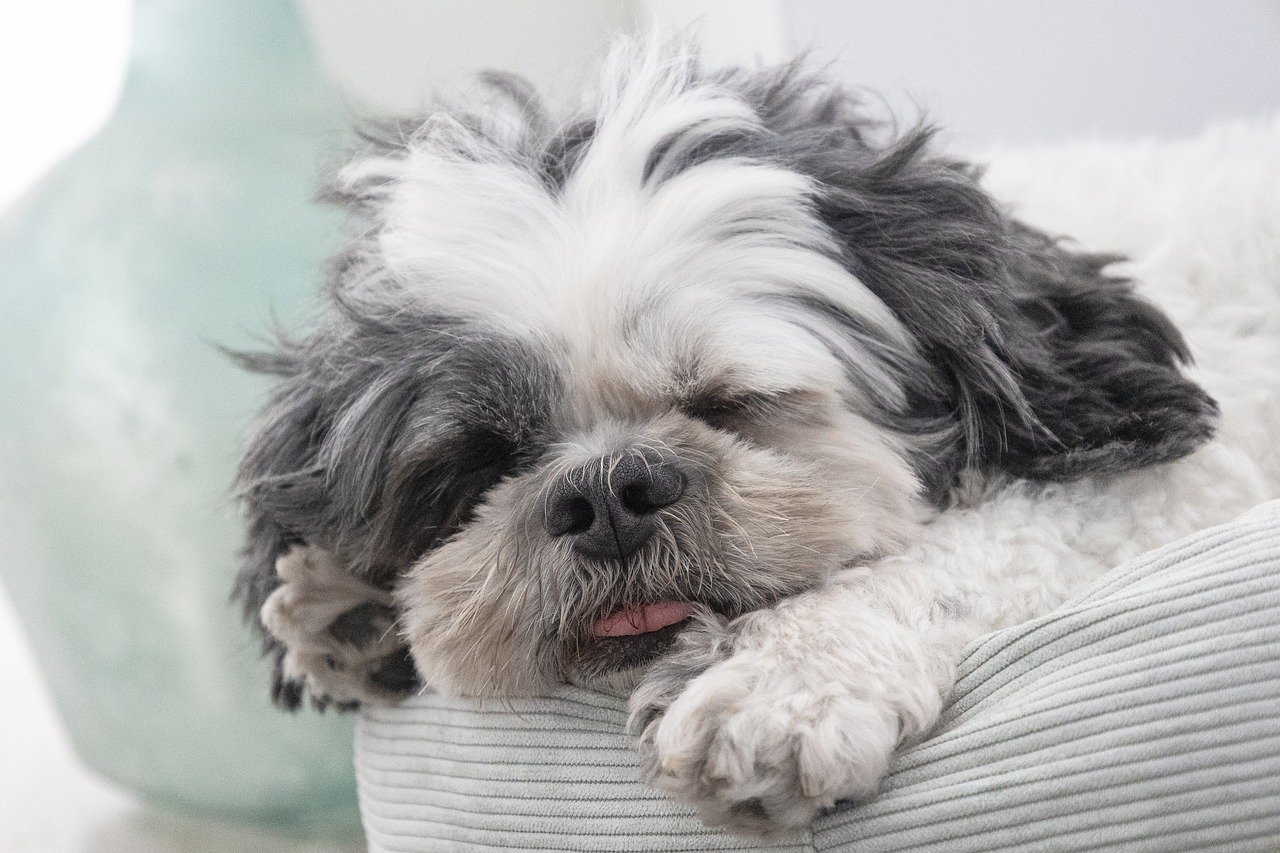
Choosing the Right Pet
When it comes to for elderly individuals, the decision can be as crucial as selecting a lifelong companion. After all, a pet is not just an animal; it becomes a part of the family, providing love, comfort, and companionship. The key is to find a pet that aligns with the elderly person's lifestyle, preferences, and physical capabilities. Factors such as size, temperament, and care requirements play a vital role in making the right choice.
For instance, if the elderly individual lives in a smaller space, such as an apartment, adopting a small dog breed or a cat can be an excellent option. These pets typically require less room to roam and can adapt well to indoor living. Breeds like Cavalier King Charles Spaniels or French Bulldogs are known for their affectionate nature and moderate exercise needs, making them perfect companions for those who may not be able to engage in rigorous outdoor activities.
Moreover, the temperament of the pet is equally important. An elderly person may benefit from a calm and gentle pet that does not exhibit hyperactive behavior. For example, Golden Retrievers and Shih Tzus are known for their friendly and easy-going nature, making them ideal for a loving relationship. On the other hand, a more energetic breed may not be suitable for someone who prefers a quieter environment.
Additionally, considering low-maintenance pets can significantly ease the responsibilities associated with pet ownership. Elderly individuals might find it beneficial to adopt pets that require less grooming and care. For instance, certain cat breeds, like the British Shorthair or the American Shorthair, are known for their low grooming needs and independent nature. Similarly, small animals like rabbits or guinea pigs can also provide companionship without demanding extensive care.
Ultimately, the goal is to enhance the quality of life for elderly individuals through pet adoption. By carefully considering the needs and lifestyle of both the pet and the owner, the bond formed can lead to a fulfilling and joyful companionship. Remember, it's not just about finding any pet; it's about finding the right pet that fits seamlessly into their life.
- What types of pets are best for elderly individuals? Small dog breeds, cats, and low-maintenance pets like rabbits are often ideal choices.
- How can I determine if a pet is suitable for an elderly person? Consider the pet's size, temperament, and care needs, and match them with the individual's lifestyle and physical capabilities.
- Are there any specific breeds recommended for seniors? Breeds like Cavalier King Charles Spaniels, French Bulldogs, and Shih Tzus are often recommended for their gentle nature.
- What are the benefits of adopting a pet for the elderly? Pets provide companionship, emotional support, and encourage physical activity, contributing to overall well-being.
Small Breeds for Limited Space
When it comes to adopting a pet, space can be a significant consideration, especially for elderly individuals living in smaller homes or apartments. Fortunately, there are many small dog breeds and cats that can make perfect companions without requiring a lot of room to roam. These pets not only provide love and affection but also fit comfortably into limited living spaces, making them ideal for seniors.
For instance, breeds such as the Cavalier King Charles Spaniel, French Bulldog, and Pug are known for their friendly nature and adaptability to smaller environments. These dogs typically enjoy lounging around the house and don’t need extensive outdoor space to thrive. In fact, they often prefer snuggling up on the couch with their owners! Similarly, cats, especially breeds like the British Shorthair or Scottish Fold, are well-suited for apartment living. They can entertain themselves and don’t require daily walks, making them low-maintenance companions.
Moreover, small pets like rabbits or guinea pigs can also be great options for seniors. They require minimal space and can be kept in comfortable cages that fit well within limited living areas. These small animals are relatively easy to care for and offer a delightful presence without overwhelming the owner with demands for exercise.
Here’s a quick comparison of some small breeds that are ideal for limited spaces:
| Breed | Size | Exercise Needs | Temperament |
|---|---|---|---|
| Cavalier King Charles Spaniel | Small | Moderate | Friendly, affectionate |
| French Bulldog | Small | Low | Playful, adaptable |
| Pug | Small | Low | Charming, sociable |
| British Shorthair (Cat) | Medium | Low | Calm, easygoing |
| Guinea Pig | Small | Low | Gentle, social |
In conclusion, adopting a small breed pet can significantly enhance the quality of life for elderly individuals, providing companionship and joy without the stress of maintaining a larger animal. The right pet can fit seamlessly into their living space, encouraging interaction and love while being easy to care for. So, if you or a loved one are considering pet adoption, think small – it might just be the best decision you ever make!
Low-Maintenance Pets
When it comes to pet adoption, many elderly individuals may feel overwhelmed by the thought of caring for a high-energy animal. However, can offer all the love and companionship without the demanding upkeep. These pets are perfect for those who want to enjoy the benefits of pet ownership without the stress that often accompanies it. Imagine having a furry friend that requires minimal grooming and exercise but still provides endless joy and affection. Isn’t that a dream come true?
One of the best options for low-maintenance pets is certain cat breeds. For instance, breeds like the British Shorthair or the American Shorthair are known for their easy-going nature and minimal grooming needs. They enjoy lounging around and are quite independent, making them perfect for elderly individuals who may not have the energy for constant play. Cats also have a unique way of providing comfort; their purring alone can be soothing and therapeutic.
In addition to cats, small animals such as rabbits, guinea pigs, or even hamsters can be fantastic companions. These pets typically require less space and can be kept in a cozy cage or pen. They are relatively easy to care for, needing just basic food, fresh water, and occasional cleaning. Plus, watching a rabbit hop around or a guinea pig squeak can bring a smile to anyone's face. It’s like having a little bundle of joy that doesn’t demand too much in return!
Here’s a quick comparison table of some popular low-maintenance pets:
| Pet Type | Grooming Needs | Exercise Requirements | Ideal Living Space |
|---|---|---|---|
| Cat | Minimal | Low | Small to Medium |
| Rabbit | Moderate | Low to Moderate | Small |
| Guinea Pig | Low | Low | Small |
| Hamster | Low | Very Low | Very Small |
Choosing a low-maintenance pet can significantly enhance the quality of life for elderly individuals. These pets provide companionship and emotional support without the burden of extensive care. They can be the perfect addition to a home, bringing warmth and joy with their presence. So, if you or someone you know is considering pet adoption, think about these gentle companions that require less but give so much in return!
Q: What are some characteristics to look for in a low-maintenance pet?
A: Look for pets that are independent, require minimal grooming, and have low exercise needs. Cats and small animals like rabbits and guinea pigs are great options.
Q: How can low-maintenance pets benefit elderly individuals?
A: They offer companionship, reduce feelings of loneliness, and can even provide emotional support without the demanding care that some pets require.
Q: Are there any specific breeds of cats that are considered low-maintenance?
A: Yes, breeds like the British Shorthair and American Shorthair are known for their easy-going nature and minimal grooming requirements.
Q: What type of small animal is best for an elderly person?
A: Rabbits, guinea pigs, and hamsters are all excellent choices, as they are generally easy to care for and require less space.
Frequently Asked Questions
- What are the emotional benefits of pet adoption for elderly individuals?
Adopting a pet can significantly reduce feelings of loneliness and depression among elderly individuals. The companionship of a pet provides emotional support, leading to improved mental health and a renewed sense of purpose in daily life.
- How does pet ownership encourage physical activity?
Owning a pet encourages elderly individuals to engage in regular physical activities such as walking, playing, and caring for their pet. This not only promotes cardiovascular health but also helps maintain mobility and overall fitness, making it easier to stay active.
- Can pets help improve social interactions?
Absolutely! Pets often serve as great conversation starters, making it easier for elderly individuals to meet new people and engage with their communities. Whether at the park or during pet-related events, pets can help foster social connections.
- What role does routine play in the life of a pet owner?
Having a pet creates a structured daily routine that can provide stability for elderly individuals. The responsibilities of caring for a pet, such as feeding and grooming, can enhance mental clarity and focus, making each day feel more purposeful.
- How do I choose the right pet for an elderly person?
Selecting the right pet involves considering factors like size, temperament, and care needs. Smaller breeds or low-maintenance pets are often ideal for elderly individuals, especially those living in smaller spaces or who may require less physical exertion.
- What types of pets are best for limited living spaces?
For those in smaller homes or apartments, small dog breeds or cats are perfect companions. They provide affection without needing extensive space or exercise, making them manageable and enjoyable for elderly owners.
- Are there low-maintenance pets suitable for seniors?
Yes! Certain cat breeds and small animals like rabbits can be great options for elderly individuals looking for low-maintenance pets. These animals typically require less grooming and care, making pet ownership more enjoyable and less stressful.

